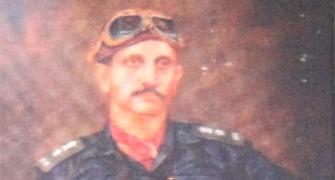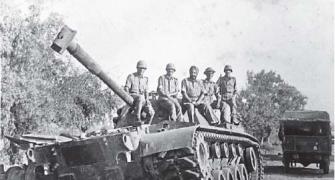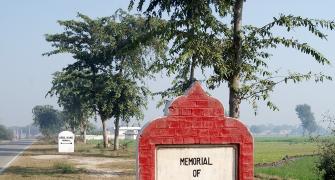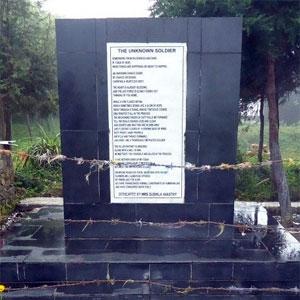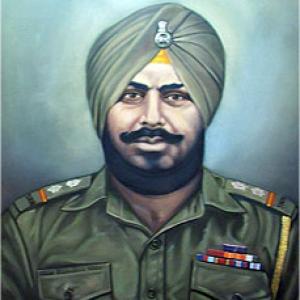Rifleman Jaswant Singh Rawat, 21, received the Mahavir Chakra in the 1962 War with China.
Such was his valour that a temple and museum stands on the land he died defending in the icy valley of Arunachal Pradesh.
Rediff.com's Archana Masih meets his family in Dehradun and discovers that in the home that he left 54 years ago his place is higher than the gods.
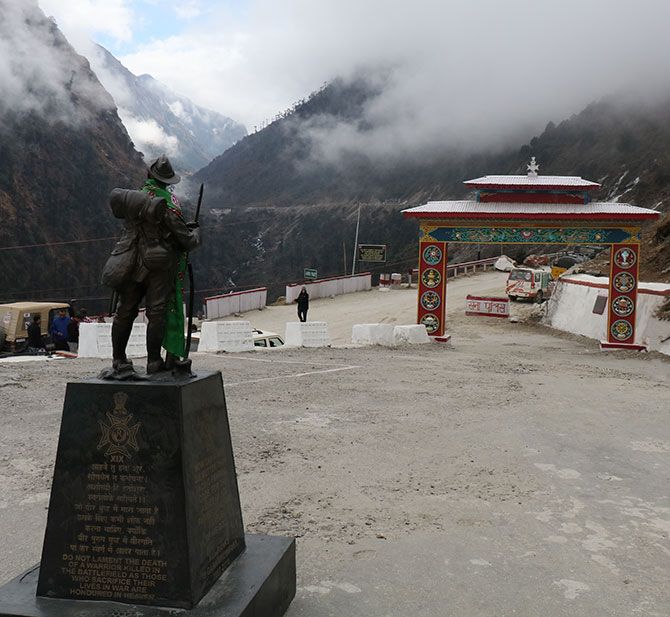
The best things collected by families are most often displayed in drawing rooms -- souveniers from different places, paintings, rare art or quirky knick-knacks -- but in Vijay Singh Rawat's drawing room, the tiny room's walls only showcase one person:
His older brother Jaswant Singh Rawat, who died fighting the Chinese in PT shoes and a rifle, in the icy reaches of NEFA (North Eastern Frontier Agency, present day Arunachal Pradesh) in the 1962 War.
The small glass showcase is full of framed photographs, trophies, photocopied newspaper articles; the wall is a shrine to his valour.
It is 54 years since his martyrdom, but the nameplate on the gate bears his name.
Just a year-and--a-half into service, Rifleman Rawat, 21, stood like a wall against Chinese troops, long after the soldiers around him had fallen in one of the Indian Army's most famous campaigns -- the Battle of Nuranang.
Troops of the 4 Garhwal regiment repelled the better equipped Chinese troops three consecutive times and lost 147 men.
Jaswant Singh died, but fought courageously for three days, and almost to the last man.
The Indian Army built a temple and memorial to him, Jaswantgarh, in Arunachal Pradesh.
Last year when his mother died at 96, the band from the Garhwal Regiment paid respect to her as her body journeyed to Haridwar for cremation.
"There were four other pyres being lit and people came running and asked, 'Is this the body of a martyr?'" says Vijay Rawat. "I said, 'Shaheed nahi, shaheed ki ma hai (she is the mother of a martyr)'."
"Everything we are is because of him. He has kept watch over our family. No one has seen God -- for us he is God."
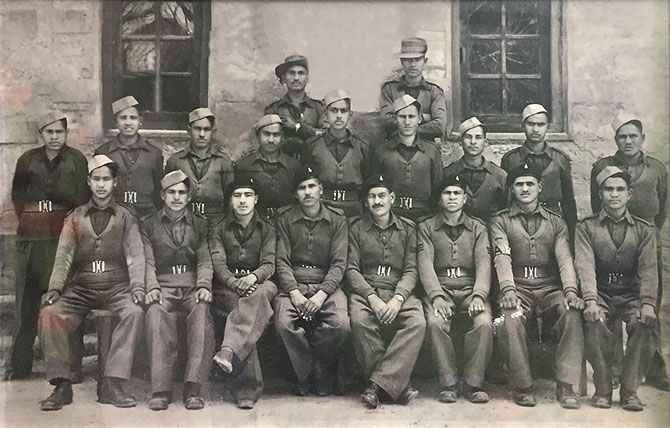
In the temple room next door, the hero's pictures hang higher than the Gods. A small silver bust of him sits among the idols.
Every day after a bath, a lamp is lit. No one in the family except Vijay Rawat has seen the soldier and it is overwhelming to see how the martyr's family remembers its own.
Last year, on November 17, family members made the pilgrimage to Jaswantgarh for the first time, to see the resting place of the 21-year-old soldier who became a legend as he met his death on the battlefield.
They had carried bedsheets from their home so that they could spread it on the bed that is still made for him every day in the memorial near Tawang, that is one of a kind and perhaps has no equivalent in the Indian Army.
Mrs Rawat takes out an album showing pictures of the family hero's memorial. "These are his personal belongings -- uniform, whistle, shoes. As a ritual, he is served whatever is cooked in the langar and soldiers stand guard. A lamp remains lit 24x7. It's a tradition that all armymen and civilians who cross that area stop and salute him."
The family had timed their visit with the day of his martyrdom and saw wreaths being laid not only from 4 Garhwal Rifles, the unit he came from, but every army unit between Assam and Arunachal.
"Such are the tales about his valour that he is considered a deity. He is part of local folklore," she says.
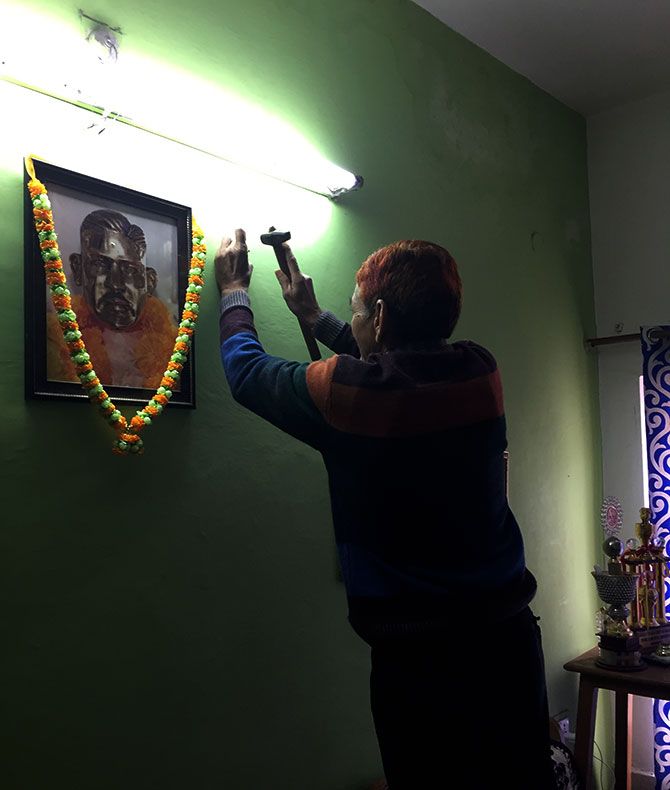
In a daring act, the young Jaswant Rawat, crawled in the snow to silence the enemy medium machine gun that was raining lethal fire on Indian troops.
His Mahavir Chakra citation reads that along with two other soldiers, he took control of the MMG, lobbed grenades and killed three Chinese soldiers. The action was crucial to changing the course of the battle.
Indian soldiers beat back the fifth Chinese attack and prevented them from capturing Arunachal. China lost over 300 men, the heaviest casualty it suffered in the war.
His blood soaked the snow. Far from his native Garhwal, the poor chowkidar's son went on to become Tawang folklore, where the unofficial story of his courage is more popular than what is written on the official plaque.
Perhaps, one reason why director Rakyesh Omprakash Mehra is planning a biopic on Jaswant Singh Rawat.
"Locals say that bhaisaab defied orders and defended his post way after the troops around him had withdrawn. He was helped by two local girls, Nura and Sela. He fired from three different locations, making the Chinese believe that they were confronted by a large number of Indian soldiers. When they finally came to know that he was the lone soldier, they shot him and severed his head," says Vijay Rawat of his older brother, taking some time to wipe his tears and compose himself.
"They say the Chinese acknowledged his bravery and sent a brass replica of his head that is now in the memorial."
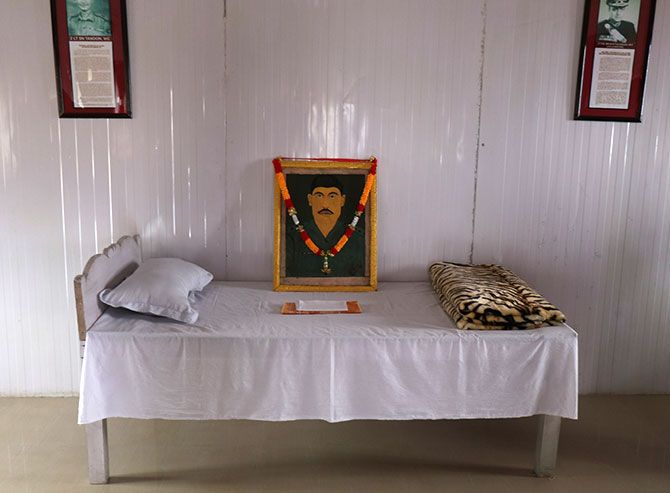
The Rawats received news of the death much later because they had moved from the address listed in Jaswant Rawat's official record.
By the time the telegram reached them, they also found out that he had received the Mahavir Chakra, India's second highest military honour for bravery in battle.
His body never came home because it was beyond recognition and the country did not have the means to bring all its soldiers home, says Vijay Rawat.
They received his trunk with some of his belongings. It had one passport picture, which they made several copies in various sizes for remembrance.
Whenever Vijay Rawat goes out, he always carries photographs of his deceased mother and martyred brother in his pocket.
"At that time the compensation was Rs 10,000. Apart from this we got pension and an additional Rs 250 as allowance for the Mahavir Chakra. We were also provided with a petrol pump, but my uncle cheated us into giving it to him," he says.
When the Mahavir Chakra allowance was later revised, he adds, they did not get the enhanced amount till they brought it to the attention of then army chief General Bikram Singh, who they met on a visit.
For years, the unit sent the mother a small amount separately by draft each month as a token of gratitude and goodwill. This was apart from the pension received from Army HQ, which used to be a paltry amount in the earlier years, but was enhanced subsequently.
When his mother passed away last year, she received a pension Rs 35,000 to Rs 40,000.
When Rakyesh Omprakash Mehra sent a staff member to their home and asked Vijay Rawat to share memories of his brother, they gave the family one lakh rupees.
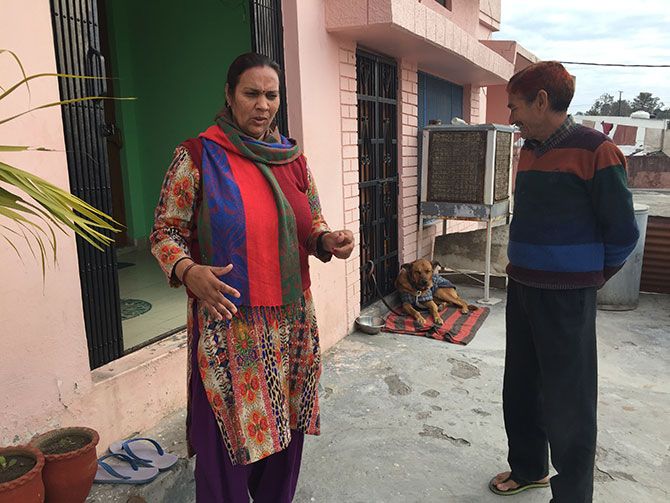
In the family drawing room, which is a shrine to his martyred brother, there is a picture of his father receiving the Mahavir Chakra from then President Dr Sarvepalli Radhakrishan, but the MVC citation is missing.
"We were not very educated and lost it while changing houses. There was also a letter by Nehruji, which also went missing," he says apologetically, showing a photocopy of Nehru's letter in Hindi.
The Mahavir Chakra was presented by his mother to the Garhwal Regimental Centre in Landsdowne, Uttarakhand, which also has a gate commemorating the martyr.
A commemorative gate dedicated to him is being built close to the house while a statue was erected at the Dehradun cantonment last year.
54 years after his brother's death, Vijay Singh Rawat is himself retired as an employee of the Survey of India.
Taking out a framed picture which is hidden behind the glass self of the drawing room, he asks for a hammer and drives a nail into the wall.
"I think my brother deserved the Param Vir Chakra. His bravery was deserving of the highest award for gallantry, not the second highest," he says hanging the picture.
"I have written to Modiji about this. If Netaji's files can be re-opened, my brother's case can also be taken up," he says.
"If not for his sacrifice, the Chinese would have reached Assam."
In November, the family is once again planning to travel to Jaswantgarh in Arunachal Pradesh. This time Vijay Singh Rawat will also join them and meet his elder brother at his final resting place.
After 54 years, he will finally get a chance to say goodbye.

